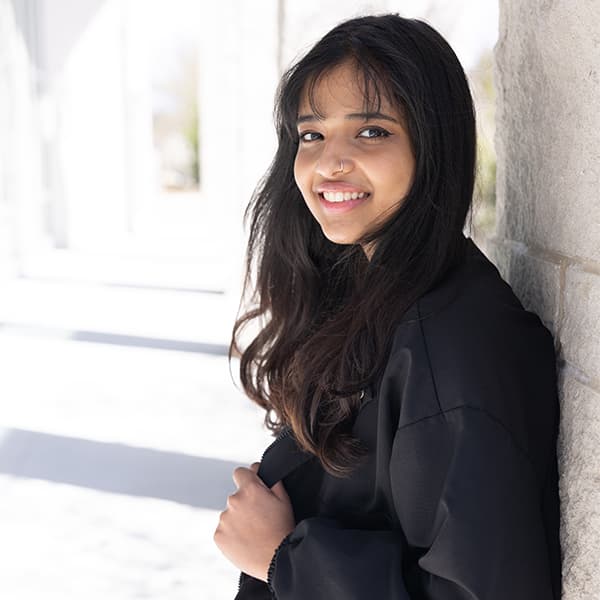Nikitha Mohan, Psychology

Nikitha Mohan was a first-year student during the COVID-19 pandemic, making her (and her class’s) undergraduate experience very different from others. However, she excelled in her Health Sciences courses and earned an “A” for each one, despite many of them being Biology and Chemistry labs that she had to complete virtually.
Most students would be satisfied with that progress. Mohan, however, was decidedly not satisfied.
A visit with her Educational Opportunity Fund advisor gave her a revelation – Health Sciences wasn’t her true passion.
“Tiffany Rice was my student coordinator, and we would have regular check-in meetings. We started talking about my passion, and I've always liked to know what's happening in the mind. She was the one who helped me change my major from Health Science to Psychology, and that really helped a lot,” Mohan said.
Soon, she started exploring the field of Psychology and saw a future where she could picture herself: industrial organizational psychology (IOP), which centers on worker satisfaction, recruitment and retention in different organizational settings.
Her internship with the American Public Transportation Association’s Human Resources department – as a Washington Center intern – reaffirmed her interest and led her to take an IOP class with Kaite Yang, associate professor of Psychology. It was then that she also began working on her distinction project with Psychology faculty member Zornitsa Kalibatseva, who encouraged her to look inward when choosing a topic. Her family, including her sister, both inspired and were supportive of her and her research. Mohan even goes as far as saying that she "could not have done any of this without them."
“I identify very strongly as an Asian immigrant woman, so I definitely wanted to do something with that, and my family, especially my dad and mom, inspired me so much. I wanted to know more about how to improve the well-being of immigrants (in the workplace) because of them," Mohan said. "I looked up topics that have previously been done on it, and there were not a lot of studies that looked at it. Even though studies looked at worker well-being in general, none were focused on immigrant groups, and if it is, in fact, on immigrant groups, most of them were focused just on the Hispanic population."
The research gap provided an exploratory opportunity that excited Mohan. She has faced numerous challenges throughout the research, such as the proliferation of online bots applying to be research participants, but has felt supported by professors Kalibatseva, Yang and Jessica Fleck throughout the process.
I've heard people say stuff about professors or universities that they attended not being the very best, but I cannot relate. This is a really nice college, and I made the right decision to come here. It's one of the best decisions that I've made.”
For Mohan, the support that Kalibatseva provided extended past her distinction project. As a fellow immigrant, Kalibatseva helped an extremely introverted Mohan feel more connected to the campus community.
“She came here when she was 17 or 18 for her undergraduate study, and when she shared her story, I was like, ‘Yeah, that sounds familiar,’ because I felt like I couldn't fit in anywhere because of who I am, even in high school,” Mohan said. “I hope people in this school meet other professors who are like that because anybody can be a professor, but not everybody can be a mentor.”
Support plays a huge role in Mohan’s life outside of the classroom as well, as demonstrated by the beaming smile she had while talking about a friend who kept her spirits up while she recovered from a herniated disk.
“It was so painful – I couldn't sit or walk or stand for a long time. It put me in a very bad mental state at the time, as I knew that I could’ve enjoyed my internship more if I wasn’t injured,” Mohan shared. “Having people like Abhiyah (Paily) who encouraged me really helped me to be where I am now. I could share that I was having a bad day with her, and she wouldn't be mad at me about it. She just understood me.”
Mohan is going to miss walking around Lake Fred but is thankful for the connections she’s made at Stockton, including with a friend who convinced her to start watching the anime “One Piece.” (“I feel like I would’ve been a better person if I watched it as a kid!”).
Overall, Stockton was a great start to an even greater future for Mohan.
“I've heard people say stuff about professors or universities that they attended not being the very best, but I cannot relate,” Mohan said. “This is a really nice college, and I made the right decision to come here. It's one of the best decisions that I've made.”


